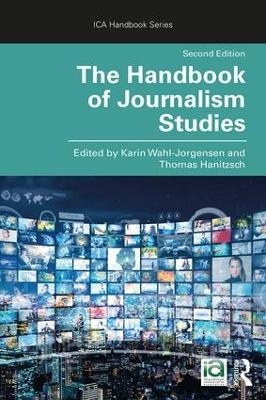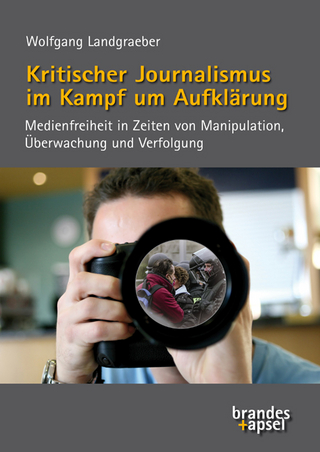
The Handbook of Journalism Studies
Routledge (Verlag)
978-1-138-05289-5 (ISBN)
The volume is structured around theoretical and empirical approaches to journalism research and covers scholarship on news production; news content; journalism and society; journalism and culture; and journalism studies in a global context. As journalism studies has become richer and more diverse as a field of study, the second edition reflects both the growing diversity of the field, and the ways in which journalism itself has undergone rapid change in recent years. Emphasizing comparative and global perspectives, this new edition explores:
Key elements, thinkers, and texts
Historical context
Current state of the field
Methodological issues
Merits and advantages of the approach/area of study
Limitations and critical issues of the approach/area of study
Directions for future research
Offering broad international coverage from world-leading contributors, this volume is a comprehensive resource for theory and scholarship in journalism studies. As such, it is a must-have resource for scholars and graduate students working in journalism, media studies, and communication around the globe.
Karin Wahl-Jorgensen is Professor in the Cardiff School of Journalism, Media, and Culture, Cardiff University, Wales, where she serves as Director of Research Development and environment. Her most recent books include Emotions, Media and Politics (2019) and Digital Citizenship in a Datafied Society (2019). She has published multiple other monographs and edited collections, and just under 100 journal articles and book chapters. Thomas Hanitzsch is Professor of Communication in the Department of Media and Communication at LMU Munich, Germany. A former journalist, his teaching and research focuses on global journalism cultures and war coverage. His most recent books include Worlds of Journalism (2019) and the Handbook of Comparative Communication Research (2012, Routledge).
Part I: Introducting Journalism Studies 1. Journalism Studies: Developments, Challenges, and Future Directions 2. Journalism History 3. Journalism Theory 4. Journalism Education Part II: News Production 5. News Organizations 6. Journalists as Gatekeepers 7. Professionalism, Professional Identity and Journalistic Roles 8. Boundary Work 9. Objectivity, Professionalism and Truth Seeking 10. Journalism and Witnessing 11. Reporters and Their Sources 12. Computational Journalism 13. Journalism, Social Media and Online Publics Part III: News Content 14. News Values and News Selection 15. Framing the News 16. News, Discourse and Ideology 17. News and Storytelling 18. Tabloidization of the News Part IV: Journalism and Society 19. Journalism and Democracy 20. Journalism Ethics 21. Economic Contexts of Journalism 22. Journalism, Public Relations and Spin 23. Journalism, Trust and Credibility 24. Journalism in War and Conflict Part V: Journalism and Culture 25. Journalism, Audiences and News Experience 26. Journalism and Everyday Life 27. Journalism and Memory 28. Citizen Journalism and Participation 29. Gender, Sex and Newsroom Culture 30. Covering Diversity Part VI: Journalism Studies in a Global Context 31. History and Development of Journalism Studies as a Global Field 32. Comparative Journalism Research 33. Journalism and Transitions to Democracy in Eastern Europe 34. Journalism and Authoritarian Resilience
| Erscheinungsdatum | 11.07.2019 |
|---|---|
| Reihe/Serie | ICA Handbook Series |
| Zusatzinfo | 9 Line drawings, black and white |
| Verlagsort | London |
| Sprache | englisch |
| Maße | 178 x 254 mm |
| Gewicht | 1060 g |
| Themenwelt | Sozialwissenschaften ► Kommunikation / Medien ► Journalistik |
| Sozialwissenschaften ► Kommunikation / Medien ► Kommunikationswissenschaft | |
| ISBN-10 | 1-138-05289-2 / 1138052892 |
| ISBN-13 | 978-1-138-05289-5 / 9781138052895 |
| Zustand | Neuware |
| Informationen gemäß Produktsicherheitsverordnung (GPSR) | |
| Haben Sie eine Frage zum Produkt? |
aus dem Bereich


